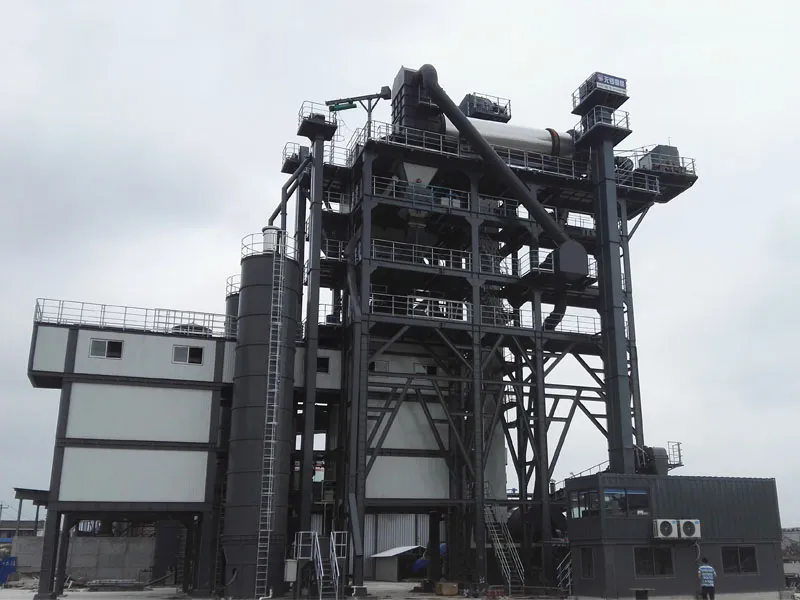Asphalt Hot Recycled Mixing Plant: Paving the Way for Sustainable Road Construction
2024-08-26
In the quest for sustainable development and environmental responsibility, the asphalt hot recycled mixing plant has emerged as a key player in the road construction industry. By enabling the reuse of asphalt material, these plants significantly reduce waste, lower costs, and minimize the environmental impact of road construction projects. In this blog, we’ll delve into the workings of asphalt hot recycled mixing plants, their benefits, and their role in promoting eco-friendly infrastructure development.
What is an Asphalt Hot Recycled Mixing Plant?
An asphalt hot recycled mixing plant is a facility designed to recycle and reuse asphalt materials from old roadways and construction projects. The plant processes reclaimed asphalt pavement (RAP) by heating it and mixing it with new asphalt binder and aggregates to produce high-quality, recycled asphalt mixtures. This process allows for the efficient reuse of existing asphalt, contributing to both economic and environmental benefits.
Key Features of Asphalt Hot Recycled Mixing Plants
1. Recycling System: The core feature of the plant is its recycling system, which includes equipment for collecting, sorting, and heating RAP. This system ensures that reclaimed asphalt is properly processed and integrated into new asphalt mixtures.
2. Heating and Mixing Units: The plant includes specialized heating units that raise the temperature of RAP to facilitate mixing with new materials. The mixing unit ensures thorough blending of the recycled asphalt with new binder and aggregates.
3. Control Systems: Advanced control systems allow for precise monitoring and adjustment of the recycling process. This includes temperature control, material feed rates, and mixing times, ensuring consistent quality in the final product.
4. Storage Facilities: The plant features storage facilities for RAP, new aggregates, and asphalt binder. Proper storage helps maintain material quality and ensures smooth operation of the mixing process.
5. Dust and Emission Control: Modern plants are equipped with dust and emission control systems to minimize environmental impact. These systems capture and filter airborne particles and emissions, contributing to cleaner operations.
6. Quality Assurance: Integrated quality assurance systems monitor the properties of the recycled asphalt mixture, including its temperature, viscosity, and composition. This ensures that the final product meets required standards and specifications.
7. Energy Efficiency: Many asphalt hot recycled mixing plants are designed with energy-efficient features, such as heat recovery systems and efficient burners. These features help reduce energy consumption and operating costs.
Benefits of Asphalt Hot Recycled Mixing Plants
1. Environmental Sustainability: By recycling RAP, these plants significantly reduce the need for new raw materials, thereby conserving natural resources and reducing landfill waste. The use of recycled materials also lowers the carbon footprint of road construction projects.
2. Cost Savings: Recycling asphalt reduces the cost of raw materials, as reclaimed asphalt is generally less expensive than new aggregates. This leads to lower overall project costs and makes road construction more economical.
3. Reduced Energy Consumption: The recycling process typically requires less energy compared to producing new asphalt from scratch. This reduction in energy consumption contributes to lower greenhouse gas emissions and a more sustainable operation.
4. Enhanced Material Quality: Modern recycling technologies ensure that the quality of recycled asphalt is comparable to that of new asphalt. This means that recycled asphalt can deliver high performance and durability in road construction.
5. Extended Pavement Life: Incorporating recycled asphalt can enhance the longevity of road surfaces. The recycled material often contains high-quality binder, which improves the overall performance of the pavement.
6. Reduced Environmental Impact: By minimizing the need for new materials and reducing waste, asphalt hot recycled mixing plants contribute to a lower environmental impact, aligning with sustainable construction practices.
7. Compliance with Regulations: Many regions have regulations and incentives for using recycled materials in construction. Asphalt hot recycled mixing plants help contractors comply with these regulations and benefit from associated incentives.
Applications of Asphalt Hot Recycled Mixing Plants
1. Road Repair and Maintenance: Recycled asphalt is commonly used for road repair and maintenance projects, such as patching potholes and resurfacing existing roads. The use of recycled materials helps extend the life of roadways and reduce maintenance costs.
2. New Road Construction: Recycled asphalt can be used in the construction of new roads, highways, and infrastructure projects. Its inclusion in the mix enhances durability and performance while reducing environmental impact.
3. Airport Runways: The durability and performance of recycled asphalt make it suitable for use in airport runways and taxiways, where high-quality surfaces are essential for safety and operational efficiency.
4. Parking Lots: Asphalt hot recycled mixing plants can supply material for parking lot construction, providing a cost-effective and sustainable option for creating durable surfaces.
5. Recreational Paths: The recycled asphalt mix is also used for constructing recreational paths, such as bike trails and pedestrian walkways, where sustainability and performance are important considerations.
6. Urban Infrastructure: In urban areas, recycled asphalt is used for various infrastructure projects, including street resurfacing and roadway improvements, contributing to the development of sustainable and resilient cities.
Choosing the Right Asphalt Hot Recycled Mixing Plant
1. Capacity and Output: Select a plant with the appropriate capacity and output for your project needs. Consider the volume of asphalt required and the scale of your recycling operations.
2. Technology and Features: Evaluate the technology and features of the plant, such as recycling systems, control systems, and energy efficiency. Choose a plant that aligns with your performance and environmental goals.
3. Material Compatibility: Ensure that the plant can handle the types of RAP and new materials you plan to use. Compatibility with various materials ensures flexibility and efficiency in the recycling process.
4. Compliance with Standards: Verify that the plant meets industry standards and regulations for quality and environmental performance. Compliance ensures that your recycled asphalt meets required specifications.
5. Cost and Budget: Consider the cost of the plant and its operational expenses. Balance the initial investment with long-term benefits, such as cost savings and environmental impact.
6. Manufacturer Support: Choose a plant from a reputable manufacturer that offers reliable support and service. Access to technical support and maintenance services ensures smooth operation and minimizes downtime.
Maintenance and Care Tips
1. Regular Inspection: Perform regular inspections of the plant’s components, including heating units, mixing systems, and control systems. Address any signs of wear or malfunction promptly.
2. Clean and Maintain Equipment: Keep the plant and its components clean to ensure optimal performance. Follow manufacturer guidelines for cleaning and maintenance procedures.
3. Monitor Performance: Use diagnostic tools and monitoring systems to track the performance of the plant and the quality of the recycled asphalt. Make adjustments as needed to maintain consistent quality.
4. Check for Wear and Tear: Inspect critical parts, such as belts, bearings, and conveyors, for signs of wear and tear. Replace or repair components as needed to prevent disruptions in operation.
5. Follow Safety Guidelines: Adhere to safety guidelines and procedures for operating the plant. Ensure that all operators are trained and equipped with appropriate safety gear.
Conclusion
The asphalt hot recycled mixing plant represents a significant advancement in sustainable road construction. By enabling the efficient recycling of asphalt materials, these plants contribute to reduced waste, lower costs, and minimized environmental impact. The benefits of using recycled asphalt—such as enhanced material quality, cost savings, and energy efficiency—make it a valuable asset in modern infrastructure development. Embrace the advantages of asphalt hot recycled mixing plants to support eco-friendly practices and build durable, high-performance roadways for the future.



